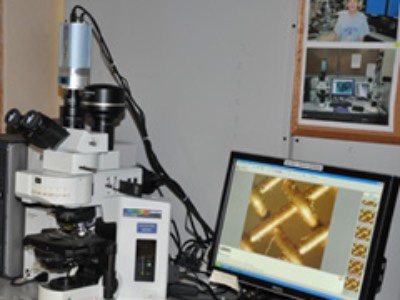Epifluorescence Optical Microscope
Upright automated microscope with reflected (fluorescence) and transmitted light capability. Flexibility for accommodating multiple sample types, including liquid cultures and biofilms.
ICAL houses a state-of-the-art, high-end Olympus optical microscope, Model BX61 (described below), available for ICAL users.
The BX61 microscope is the perfect union of Olympus infinity-corrected objectives, advanced fluorescence technology and motorized capabilities. Front operation and reduced vibration of the fixed stage microscope achieves a higher standard of stability and reliability. The BX61 is a research microscope built on the platform of the traditional upright frame. Most major microscope functions are automated, including focus, illumination, and filter wheels. A complete software command set allows for full computer control.

The ICAL Olympus microscope is equipped with two digital cameras: (1) the DP71 color digital camera with high speed, high resolution (up to 4080 × 3072 pixels) and low light sensitivity to accommodate most applications in transmitted and fluorescence modes and (2) a high-resolution, high-speed, and high-sensitivity RETIGA-2000RV black and white digital CCD camera, allowing users to perform difficult live-cell and fluorescence imaging experiments. Both cameras deliver superb image quality for a broad range of applications.
The accompanying Olympus Microsuite™ software allows image enhancement, text and scale bar overlays, and permits combining multi-fluorescence acquisitions into a single image and a live image output at a 13 × 1024 resolution at 15 frames per second to your desktop. Time-lapse image acquisition is also possible, and the cameras are simple to use and focus even in low-light situations. The Retiga-2000RV FAST 2MP monochrome digital camera images can be false colored for presentations and publications.
Water immersion objective lenses allow for direct observation of liquid biological samples including biofilms and individual microorganisms. Biological and non-biological samples can be imaged with the precision UIS2 optics (new from Olympus), offering the highest quantum efficiency and range of transmission (from UV to IR) available today. Olympus UIS2 objectives provide the best signal-to-noise ratio via a totally new design to curtail autofluorescence from all possible sources, such as glass materials, coatings and cementing materials. Transmitted light phase contrast or Nomarski differential interference contrast (DIC) techniques are available.
Training courses are offered for academic, government and commercial users as well as technical assistance by trained ICAL personnel.
In summary, the ICAL Olympus BX61 microscope offers the following:
- Precision objectives including air, oil, and water immersion objectives
- Suite of reflected (fluorescent) filters (DAPI, FITC/CY2, TRITC/CY3, triple band and RBF)
- Significantly reduced autofluorescence and signal-to-noise ratio
- DIC imaging (10×, 20×, 40×, 60×)
- Digital camera imaging for still and time-lapse observations

